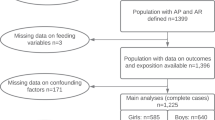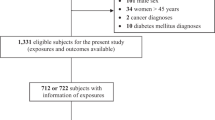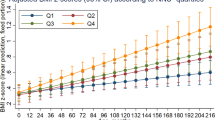Abstract
Background:
Breastfeeding duration is associated with the risks of cardio-metabolic diseases in adulthood. We examined the associations of infant feeding patterns with metabolic outcomes in children and whether any association was explained by family-based socio-demographic, maternal lifestyle-related or childhood factors.
Subjects/methods:
We performed a population-based prospective cohort study in 3417 children to examine the associations of breastfeeding duration and exclusivity and age at introduction of solid foods with blood levels of lipids, insulin and C-peptide and risk of clustering of cardio-metabolic risk factors at the median age of 6.0 years (90% range 5.7–6.8).
Results:
We observed that, in the models only adjusted for child’s age and sex, ever breastfeeding was not associated with childhood blood levels of lipids but was associated with higher insulin and C-peptide concentrations (P-value<0.05). Breastfeeding duration and exclusivity were not consistently associated with metabolic outcomes. Early introduction of solid foods was associated with higher levels of total cholesterol (P-value<0.05) but not with high-density lipoprotein and low-density lipoprotein cholesterol, triglycerides and insulin levels. Shorter breastfeeding duration and exclusive breastfeeding were associated with increased risks of clustering of cardio-metabolic risk factors. After additional adjustment for family, maternal and childhood factors, none of these associations remained significant.
Conclusions:
In conclusion, we found no consistent associations of infant feeding patterns with metabolic outcomes at school age, after taking into account family-based socio-demographic, maternal lifestyle-related or childhood factors. Whether infant diet composition influences metabolic outcomes in later life should be further studied.
This is a preview of subscription content, access via your institution
Access options
Subscribe to this journal
Receive 12 print issues and online access
$259.00 per year
only $21.58 per issue
Buy this article
- Purchase on Springer Link
- Instant access to full article PDF
Prices may be subject to local taxes which are calculated during checkout


Similar content being viewed by others
References
Owen CG, Martin RM, Whincup PH, Smith GD, Cook DG . Effect of infant feeding on the risk of obesity across the life course: a quantitative review of published evidence. Pediatrics 2005; 115: 1367–1377.
Owen CG, Martin RM, Whincup PH, Smith GD, Cook DG . Does breastfeeding influence risk of type 2 diabetes in later life? A quantitative analysis of published evidence. Am J Clin Nutr 2006; 84: 1043–1054.
Martin RM, Gunnell D, Smith GD . Breastfeeding in infancy and blood pressure in later life: systematic review and meta-analysis. Am J Epidemiol 2005; 161: 15–26.
Williams DM, Martin RM, Davey Smith G, Alberti KG, Ben-Shlomo Y, McCarthy A . Associations of infant nutrition with insulin resistance measures in early adulthood: evidence from the Barry-Caerphilly Growth (BCG) study. PLoS One 2012; 7: e34161.
Owen CG, Whincup PH, Kaye SJ, Martin RM, Davey Smith G, Cook DG et al. Does initial breastfeeding lead to lower blood cholesterol in adult life? A quantitative review of the evidence. Am J Clin Nutr 2008; 88: 305–314.
Martin RM, Davey Smith G . Does having been breastfed in infancy influence lipid profile in later life? a review of the literature. Adv Exp Med Biol 2009; 646: 41–50.
Armstrong J, Reilly JJ, Child Health Information Team. Breastfeeding and lowering the risk of childhood obesity. Lancet 2002; 359: 2003–2004.
Singhal A, Fewtrell M, Cole TJ, Lucas A . Low nutrient intake and early growth for later insulin resistance in adolescents born preterm. Lancet 2003; 361: 1089–1097.
Owen CG, Whincup PH, Odoki K, Gilg JA, Cook DG . Infant feeding and blood cholesterol: a study in adolescents and a systematic review. Pediatrics 2002; 110: 597–608.
Hamosh M . Does infant nutrition affect adiposity and cholesterol levels in the adult? J Pediatr Gastroenterol Nutr 1988; 7: 10–16.
Fewtrell MS . Breast-feeding and later risk of CVD and obesity: evidence from randomised trials. Proc Nutr Soc 2011; 70: 472–477.
de Jonge LL, Langhout MA, Taal HR, Franco OH, Raat H, Hofman A et al. Infant feeding patterns are associated with cardiovascular structures and function in childhood. J Nutr 2013; 143: 1959–1965.
Kramer MS, Guo T, Platt RW, Shapiro S, Collet JP, Chalmers B et al. Breastfeeding and infant growth: biology or bias? Pediatrics 2002; 110: 343–347.
Li R, Fein SB, Grummer-Strawn LM . Do infants fed from bottles lack self-regulation of milk intake compared with directly breastfed infants? Pediatrics 2010; 125: e1386–e1393.
Thompson AL . Developmental origins of obesity: early feeding environments, infant growth, and the intestinal microbiome. Am J Hum Biol 2012; 24: 350–360.
van Rossem L, Oenema A, Steegers EA, Moll HA, Jaddoe VW, Hofman A et al. Are starting and continuing breastfeeding related to educational background? The generation R study. Pediatrics 2009; 123: e1017–e1027.
Jaddoe VW, van Duijn CM, Franco OH, van der Heijden AJ, van Iizendoorn MH, de Jongste JC et al. The Generation R Study: design and cohort update 2012. Eur J Epidemiol 2012; 27: 739–756.
Durmus B, van Rossem L, Duijts L, Arends LR, Raat H, Moll HA et al. Breast-feeding and growth in children until the age of 3 years: the Generation R Study. Br J Nutr 2011; 105: 1704–1711.
Durmus B, Ay L, Duijts L, Moll HA, Hokken-Koelega AC, Raat H et al. Infant diet and subcutaneous fat mass in early childhood: the Generation R Study. Eur J Clin Nutr 2012; 66: 253–260.
Durmus B, Heppe DH, Gishti O, Manniesing R, Abrahamse-Berkeveld M, van der Beek EM et al. General and abdominal fat outcomes in school-age children associated with infant breastfeeding patterns. Am J Clin Nutr 2014; e-pub ahead of print 12 March 2014; doi:10.3945/ajcn.113.075937.
Steinberger J, Daniels SR, Eckel RH, Hayman L, Lustig RH, McCrindle B et al. Progress and challenges in metabolic syndrome in children and adolescents. A Scientific Statement from the American Heart Association Atherosclerosis, Hypertension, and Obesity in the Young Committee of the Council on Cardiovascular Disease in the Young; Council on Cardiovascular Nursing; and Council on Nutrition, Physical Activity, and Metabolism. Circulation 2009; 119: 628–647.
Kaul S, Rothney MP, Peters DM, Wacker WK, Davis CE, Shapiro MD et al. Dual-energy X-ray absorptiometry for quantification of visceral fat. Obesity (Silver Spring) 2012; 20: 1313–1318.
Wong SN, Tz Sung RY, Leung LC . Validation of three oscillometric blood pressure devices against auscultatory mercury sphygmomanometer in children. Blood Press Monit 2006; 11: 281–291.
Allochtonen in Nederland 2004. Statistics Netherlands: Voorburg/Heerlen, Netherlands, 2004.
Standaard onderwijsindeling 2003. Statistics Netherlands: Voorburg/ Heerlen, Netherlands, 2004.
American Academy of Pediatrics. Committee on Public Education. American Academy of Pediatrics: Children, adolescents, and television. Pediatrics 2001; 107: 423–426.
Sterne JA, White IR, Carlin JB, Spratt M, Royston P, Kenward MG et al. Multiple imputation for missing data in epidemiological and clinical research: potential and pitfalls. BMJ 2009; 338: b2393.
Nohr EA, Frydenberg M, Henriksen TB, Olsen J . Does low participation in cohort studies induce bias? Epidemiology 2006; 17: 413–418.
Li R, Scanlon KS, Serdula MK . The validity and reliability of maternal recall of breastfeeding practice. Nutr Rev 2005; 63: 103–110.
Cupul-Uicab LA, Gladen BC, Hernandez-Avila M, Longnecker MP . Reliability of reported breastfeeding duration among reproductive-aged women from Mexico. Matern Child Nutr 2009; 5: 125–137.
Indicators for Assessing Breast-Feeding Practices. WHO Document WHO/CDD/SER/9114. World Health Organization: Geneva, Switzerland, 1991.
Langsted A, Freiberg JJ, Nordestgaard BG . Fasting and nonfasting lipid levels: influence of normal food intake on lipids, lipoproteins, apolipoproteins, and cardiovascular risk prediction. Circulation 2008; 118: 2047–2056.
Ravelli ACJ, van der Meulen JHP, Osmond C, Barker DJP, Bleker OP . Infant feeding and adult glucose tolerance, lipid profile, blood pressure, and obesity. Arch Dis Child 2000; 82: 248–252.
Fall CH, Borja JB, Osmond C, Richter L, Bhargava SK, Martorell R et al. Infant-feeding patterns and cardiovascular risk factors in young adulthood: data from five cohorts in low- and middle-income countries. Int J Epidemiol 2011; 40: 47–62.
Das UN . The lipids that matter from infant nutrition to insulin resistance. Prostaglandins Leukot Essent Fatty Acids 2002; 67: 1–12.
Owen CG, Whincup PH, Cook DG . Breast-feeding and cardiovascular risk factors and outcomes in later life: evidence from epidemiological studies. Proc Nutr Soc 2011; 70: 478–484.
Holmes VA, Cardwell C, McKinley MC, Young IS, Murray LJ, Boreham CA et al. Association between breast-feeding and anthropometry and CVD risk factor status in adolescence and young adulthood: the Young Hearts Project, Northern Ireland. Public Health Nutr 2010; 13: 771–778.
Demmers TA, Jones PJ, Wang Y, Krug S, Creutzinger V, Heubi JE . Effects of early cholesterol intake on cholesterol biosynthesis and plasma lipids among infants until 18 months of age. Pediatrics 2005; 115: 1594–1601.
Kramer MS, Moodie EE, Platt RW . Infant feeding and growth: can we answer the causal question? Epidemiology 2012; 23: 790–794.
Martin RM, Patel R, Kramer MS, Vilchuck K, Bogdanovich N, Sergeichick N et al. Effects of promoting longer-term and exclusive breastfeeding on cardiometabolic risk factors at age 11.5 years: a cluster-randomized, controlled trial. Circulation 2014; 129: 321–329.
Burdette HL, Whitaker RC, Hall WC, Daniels SR . Breastfeeding, introduction of complementary foods, and adiposity at 5 y of age. Am J Clin Nutr 2006; 83: 550–558.
Scholtens S, Wijga AH, Smit HA, Brunekreef B, de Jongste JC, Gerritsen J et al. Long-chain polyunsaturated fatty acids in breast milk and early weight gain in breast-fed infants. Br J Nutr 2009; 101: 116–121.
Acknowledgements
The Generation R Study is conducted by the Erasmus Medical Center in close collaboration with the School of Law and Faculty of Social Sciences of the Erasmus University Rotterdam; the Municipal Health Service Rotterdam area, Rotterdam; the Rotterdam Homecare Foundation, Rotterdam; and the Stichting Trombosedienst and Artsenlaboratorium Rijnmond (STAR), Rotterdam. We gratefully acknowledge the contribution of participating mothers, general practitioners, hospitals, midwives and pharmacies in Rotterdam. We received funding from the European Union's Seventh Framework Programme (FP7/2007–2013), project EarlyNutrition under grant agreement no. 289346. VWVJ received an additional grant from the Netherlands Organisation for Scientific Research (NWO-VIDI 016.136.361). OHF works in ErasmusAGE, a center for aging research across the life course funded by Nestlé Nutrition (Nestec Ltd.), Metagenics Inc. and AXA. These sponsors had no role in design and conduct of the study, analysis and interpretation of the data, and preparation, review or approval of the manuscript.
AUTHOR CONTRIBUTIONS
OG, RG and VWVJ designed and conducted the research and wrote the paper. OG analyzed the data. BD, OHF, AH and LD provided comments and consultation regarding the analyses and manuscript. OG, RG and VWVJ had primary responsibility for final content. All authors gave final approval of the version to be published.
Author information
Authors and Affiliations
Corresponding author
Ethics declarations
Competing interests
The authors declare no conflict of interest.
Additional information
Supplementary Information accompanies this paper on European Journal of Clinical Nutrition website
Supplementary information
Rights and permissions
About this article
Cite this article
Gishti, O., Gaillard, R., Durmuş, B. et al. Infant diet and metabolic outcomes in school-age children. The Generation R Study. Eur J Clin Nutr 68, 1008–1015 (2014). https://doi.org/10.1038/ejcn.2014.81
Received:
Revised:
Accepted:
Published:
Issue Date:
DOI: https://doi.org/10.1038/ejcn.2014.81
This article is cited by
-
Influence of breastfeeding on retinal vessel calibers in school-age children. The Generation R Study
European Journal of Clinical Nutrition (2016)
-
The Generation R Study: Biobank update 2015
European Journal of Epidemiology (2014)



